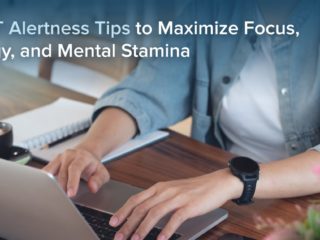| Getting your Trinity Audio player ready... |
Quick Answer
Consistently eating the right foods can sharpen your focus and boost your energy while studying for the GMAT. Nutrient-rich options such as spinach, kale, blueberries, walnuts, almonds, salmon, eggs, and dark chocolate help your brain perform at its best, especially when paired with proper hydration and balanced meals. Keep reading to discover which GMAT brain foods to add to your prep routine and take to the test center.
Here are the topics we’ll cover:
- What Foods Are Best for GMAT Prep?
- Smart Hydration Choices for GMAT Prep
- Healthy Snacks to Eat While Studying
- Should I Eat Before the GMAT Exam?
- Key Takeaways
- Frequently Asked Questions (FAQ)
- What’s Next?
What Foods Are Best for GMAT Prep?
Your GMAT prep and study plan are the foundation of a successful testing strategy, but what you eat can play an important role as well. That said, if you’re looking for brain-boosting foods that will instantly propel you to a 645+ score, you might be somewhat disappointed. However, there are foods for GMAT prep that fuel our bodies with essential nutrients and keep our blood sugar stable so we can stay sharp during study sessions and on test day.
Here are some GMAT brain foods known to support brain health over time without weighing you down or causing glucose spikes:
- Fatty fish — Salmon, sardines, and mackerel contain omega-3s, which are linked to learning and memory.
- Nuts — Walnuts and almonds support brain health and make easy, filling study snacks.
- Leafy greens — Kale, spinach, collards, and broccoli contain antioxidants essential for brain health.
- Blueberries — Blueberries support memory and brain function.
- Eggs — Eggs are an excellent source of protein and provide steady energy without glucose spikes.
- Dark chocolate — Research suggests that dark chocolate in moderation boosts attention and working memory.
KEY FACT:
Consistently eating foods such as fatty fish, nuts, berries, eggs, and leafy greens supports brain health over time.
Now that you know about some of the best GMAT brain food options, let’s talk about the role proper hydration plays in your GMAT prep.
Smart Hydration Choices for GMAT Prep
It’s easy to forget to hydrate when we’re deeply focused on a task, but for effective study sessions, it’s important to make time. After all, there’s a direct connection between hydration and brain function: even mild dehydration has been shown to impair concentration.
So, what are the best hydration choices to make for your diet for GMAT preparation?
Of course, water is an easy choice because it replaces fluid loss without sugar or stimulants. If plain water feels boring, try adding a squeeze of lemon, cucumber slices, or berries. Another solid option is coconut water, which is naturally rich in electrolytes. What about sports drinks? Sports drinks support hydration because they contain sodium, potassium, and electrolytes to help your body absorb fluids. That said, keep in mind that the high sugar content in some of them can cause a glucose spike that leads to a blood sugar crash.
Consistency is key when it comes to staying hydrated. Therefore, when you’re studying, make hydrating easy to remember by keeping water on your desk and using an app to set reminders.
TTP PRO TIP:
Even mild dehydration reduces focus, so remember to hydrate regularly to keep your brain sharp.
Next, let’s discuss healthy study snacks for GMAT prep.
Healthy Snacks to Eat While Studying
When we’re locked into an intense study session, it’s important to remember to take breaks to reset and refuel. During GMAT prep, the goal is to maintain focus, alertness, and energy. Therefore, the most beneficial healthy study snacks are foods that fight fatigue by not weighing us down or causing glucose spikes and energy crashes. The best snacks for brain power contain protein, healthy fats, complex carbs, and fiber to keep us fuller longer.
Here are a few quick and easy snack options:
- whole-grain crackers and hummus
- veggie sticks with cottage cheese dip
- Greek yogurt with blueberries and granola
- a banana and a handful of chopped nuts
- rice cakes topped with avocado or peanut butter
- apple slices and cheese cubes
KEY FACT:
Even a short snack break helps you reset so you can sustain focus during long GMAT study sessions.
GMAT Test Day Snacks
What about snacks for exam day? Remember, food, drinks, and candy aren’t allowed in the testing room. The good news is, you can bring a snack to eat during the 10-minute break. Smart GMAT test day snacks are those that don’t require refrigeration and are easily stored in your locker at the test center. Some natural energy-boosting foods to snack on include air-popped popcorn, trail mix, granola, a piece of fruit, or a protein bar.
TTP PRO TIP:
Pack an easily stored snack such as trail mix or fruit to revive your focus and energy during the GMAT break.
Should I Eat Before the GMAT Exam?
Going into the GMAT on an empty stomach is most definitely not a winning strategy! The GMAT calls for mental stamina, energy, and focus. Skipping meals sets you up for fatigue and weakens your concentration. Not only that, an empty stomach can make you uncomfortable, leaving you distracted. For these reasons, you should fuel your body and brain before the exam so you can stay alert and focused.
When deciding what to eat before the GMAT, choose foods with the same qualities as those we recommend for snacks: balanced, nutrient-dense, and steady in energy release.
Smart Pre-Exam Meal Ideas:
- oatmeal with walnuts and blueberries
- 2 eggs with whole-grain toast and avocado
- a smoothie (spinach, berries, nut butter, and oats)
- grilled salmon with quinoa and roasted veggies
- a turkey and avocado wrap (with a whole-grain tortilla)
- whole-grain pasta with walnut pesto and spinach
Eat about 1.5 to 2 hours before the test so you have steady energy without feeling overly full.
TTP PRO TIP:
An empty stomach can be distracting, so make time for a balanced pre-exam meal to keep yourself comfortable and focused.
Key Takeaways
- Fuel with brain foods. Choose nutrient-dense options such as fish, nuts, eggs, greens, and berries.
- Remember to hydrate. Even mild dehydration can reduce concentration, so keep water handy during prep sessions.
- Snack smart while studying. Snack on low-sugar foods with protein and fiber for fullness and steady energy.
- Eat a balanced pre-exam meal. It’s best not to test on an empty stomach. Aim for a balanced meal 1–2 hours before the GMAT.
Frequently Asked Questions (FAQ)
What foods improve focus, memory, and concentration?
Several brain-boosting foods support focus, memory, and concentration over time. Research suggests that fatty fish, nuts, leafy greens, blueberries, eggs, and dark chocolate play a role in memory and concentration.
What should I eat before an exam?
Eat a balanced, nutrient-dense meal 1.5 to 2 hours before the GMAT. Pre-exam meal ideas include oatmeal with walnuts and blueberries, eggs with whole-grain toast and avocado, or a smoothie with spinach, berries, and nut butter. These choices provide steady energy that can help you stay focused for the entire test.
Are there foods that fight brain fatigue?
The best way to fight brain fatigue is to avoid foods that cause energy spikes and crashes. Instead, choose healthy snacks such as nuts, whole grains, fruit, protein, or dark chocolate in moderation.
What’s Next?
Fueling your body is important, but so is fueling your motivation to study! Check out this article on how to find your GMAT motivation.
If you’re interested in ways to boost your GMAT performance beyond nutrition, this article on how to improve your GMAT score offers practical strategies.



